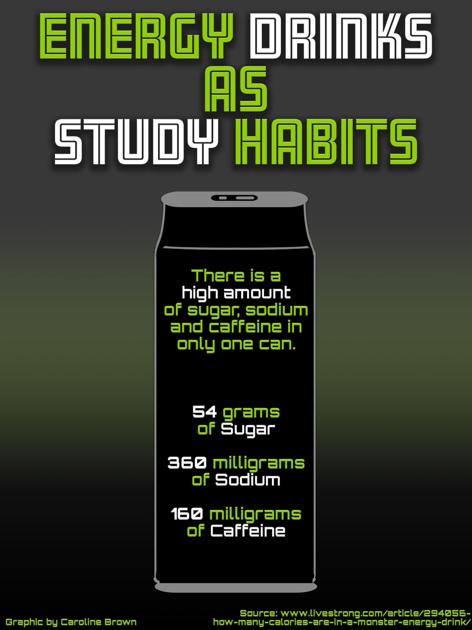Students who study for long periods of time using energy drinks may think they are being productive by staying up and consuming these energy drinks, but there could be some downsides.
One may need to consider the amount of energy drinks they consume and the long-term effects that may result from this consumption.
Allison Childress, assistant professor and director of Online Master’s Program for Nutritional Science at Texas Tech, said the American Heart Association recommends limiting the amount of added sugars to no more than 100 calories per day, or six teaspoons, for women and 150 calories per day, or nine teaspoons, for men. For reference, one 12-ounce can of regular soda contains eight teaspoons of sugar and 130 calories.
Up to 400 milligrams of caffeine a day, Childress said, is safe for most healthy adults.
“That equals about four cups of brewed coffee, 10 cans of cola, two energy shot drinks, or one to two energy drinks,” she said. “However, depending on factors like body weight, medications and individual sensitivity, this can vary for each individual.”
Students who use energy drinks to stay awake for studying run the risk of becoming addicted to caffeine, over consuming it or gaining weight from excess calorie consumption, Childress said. They may suffer from withdrawal-like symptoms when they cut back.
Symptoms of over consuming caffeine include insomnia, jitters, anxiousness, elevated heart rate, upset stomach, nausea and headaches, Childress said. Withdrawal symptoms are similar and can include headaches, fatigue, anxiety, difficulty concentrating, depressed mood, irritability, shaking and low-energy.
If students use caffeine to stay awake to study, Childress said they are doing more harm than good. When the caffeine wears off, students can have a difficult time concentrating, which could result in low test scores.
“Energy drinks are not recommended for anyone,” she said. “They contain high doses of stimulants, lots of sugar and also contain many proprietary blends of ingredients that have not been researched for safety or efficacy.”
Excessive sugar consumption can lead to weight gain and fatty liver disease, a contributor to diabetes, Childress said. Research indicates there is a connection between a high sugar diet and heart disease, and excess sugar intake can elevate blood pressure and increase inflammation.
“There are also dental health effects of consuming too much sugar, including tooth decay,” she said.
Holli Booe, instructor and director of Didactic Program in dietetics at Tech, said all people and sugars are not created equally.
“A 250-pound man and a 150-pound woman will have significantly different nutrient and carbohydrate needs,” she said. “It is also a bit different to get sugars from fruits or milk where you are getting a great deal of nutrients along with the sugars, versus just sugar you might find in a soda or energy drink.”
Normally, energy is interchangeable with calories, Booe said. The way energy drinks provide energy is through calories from sugars. Most college students are not aware how long caffeine stays in the body.
Individuals metabolize caffeine at different rates, Booe said. The half-life of caffeine is around five to six hours. If someone drinks coffee all day and into the evening, it will keep them from sleeping, resulting in a cycle of tiredness.
Health concerns related to energy drinks in teenagers include but are not limited to risks for cardiac events, especially when drinking it in quick succession, Booe said.
Cassidy Barrett, a sophomore early childhood education major from Fort Worth, said she relies on energy drinks to push her through a tough study session.
The only side effect Barrett said she has experienced is when she drank energy drinks consistently, and on the day she did not have a single one, she got a headache.
“Energy drinks help me focus while I’m studying for exams and give me the ability to study and do homework for long periods of time,” she said.
